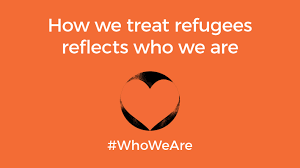Image credit: Peace Hub
A personal response to the war in Ukraine
It has been 22 days since Russia invaded Ukraine and like so many of us, I have been taking the time to try and process all that is happening. The emotional response to war feels like going through different stages, akin to the stages of grief and loss. The hope that things do not escalate and then the shock when they do. The feelings of helplessness and anxiety when you see what is happening and think about what may happen next. The guilt in feeling safe and being able to go about your everyday life, whilst wondering how you can make a small difference. This can revert back to hope whenever there is the slightest positive news to hold on to, only for all the other feelings to come crashing down again at any given time.
The war in Ukraine and its wide-reaching consequences is terrifying and decimating. Another feeling I have found hard to understand is how this war has a difference in tone in how it is presented in media outlets and by those who are giving their opinions on it. There are countless examples of journalists saying this war is acutely deplorable and shocking because this is happening in Europe. As Nesrine Malik has written in the Guardian, ‘From the tone of much coverage, this seems uniquely distressing and more alarming to them because the lives of non-Europeans have less value, and their conflicts are contained, far away from us.’
It has been upsetting to feel that some people should be given more empathy, rights and resources because they may look like more of us or live in a continent we do. This bias is another stark reminder of how much further society needs to go so that it is reflective of a more just and fair world. All refugees and those seeking asylum need a more humane response. In Reading, we are fortunate to have Reading Refugee Support Group and partner organisations who have been advocating for the rights of refugees and people seeking asylum for over 27 years. Read more about their history and the work they do here.
I think that this can be a time for us all to reflect on how we responded in the past, are currently and will do in the future.
How can we support our colleagues and our organisations so that we are highlighting the needs of all people in a fairer way? How can we all learn from the support that is rightly being provided and advocated for those fleeing Ukraine, and how can we replicate this in future when inevitably another war or crisis occurs and people find themselves displaced and seeking refuge?
Some tips I have found useful to look after your own mental wellbeing:
- Speak to someone you trust
- Set time limits when reading, listening to the news and avoid this before bedtime
- Take time to do things you enjoy
- Look for pockets of happiness in your everyday
Further resources can be found www.mind.org.uk and RVA’s Directory has information for local support groups. I would like to thank the work colleagues and friends I have talked to about this who have helped me start to navigate my way through my own emotions and responses.
Not everything that is faced can be changed, but nothing can be changed if it is not faced. James Baldwin




